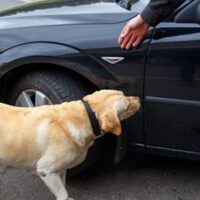Can the Police Detain You in Order to Conduct a “Dog Sniff” of Your Car?

Police officers frequently use K-9 units to perform “dog sniffs” of a suspect’s car for the possible presence of illegal drugs. But as the United States Supreme Court has explained, absent “reasonable suspicion” of criminal activity, a police officer may not extend an otherwise routine traffic stop in order to conduct a drug sniff. Even requiring a person to wait a few minutes for a K-9 unit to arrive may be considered a constitutional violation.
Florida Appeals Court Tosses Drug Conviction Due to Improper Search
Indeed, the Florida First District Court of Appeal recently tossed a drug conviction based on a K-9 search that violated the Supreme Court’s rule. This case, Ridgeway v. State, began when a citizen approached a police officer to report a “woman in a nearby car [who] was using drugs or could possibly be having a seizure,” according to court records. The officer approached the car in question. The vehicle was parked. The defendant was asleep behind the wheel.
As the officer later testified, he did not find any evidence of drug use or a medical emergency. The defendant exited the vehicle and spoke to the officer without slurring her words. Nor did the officer see any drugs or drug paraphernalia on the defendant or inside of the car. The officer asked for permission to search the car, but the defendant exercised her constitutional right to refuse.
Despite a lack of any evidence of criminal activity, the officer decided to call for a K-9 unit to conduct a dog sniff of the defendant’s car. The officer forced the defendant to wait about 10 minutes before the K-9 unit arrived. The dog sniff subsequently discovered evidence that was used to justify the defendant’s arrest.
Before the trial court, the defendant agreed to plead guilty but reserved her right to appeal the judge’s denial of her motion to suppress the results of the dog sniff. On appeal, the First District agreed with the defendant that the dog sniff was unconstitutional. The appellate court noted the officer had a valid reason for conducting his initial investigation of the defendant based on the bystander’s tip. But once that investigation determined there was “no indication of medical emergency or drug use,” the officer had no “reasonable suspicion” to justify holding the defendant an additional 10 minutes until the K-9 unit arrived. As such, the trial court should have suppressed the drugs found in the defendant’s car.
Contact AsiliA Law Firm Today
There are two important lessons you should take from this case. First, you should never give the police consent to search your car without a warrant. Had the defendant in the case above given such consent, she would not have had any grounds to challenge the use of the evidence against her in court.
This leads to the second lesson: You always have the right to appeal an adverse decision on a motion to suppress. Even if the trial judge accepts the prosecution’s view of what happened, an appeals court may see things differently. That is why you should work with an experienced Miami criminal appeals lawyer if you need advice and representation in appealing a conviction. Call AsiliA Law Firm today at 786-420-3014 or contact us online to schedule an initial consultation.
Source:
1dca.flcourts.gov/content/download/2437358/opinion/Opinion_2022-2275.pdf
